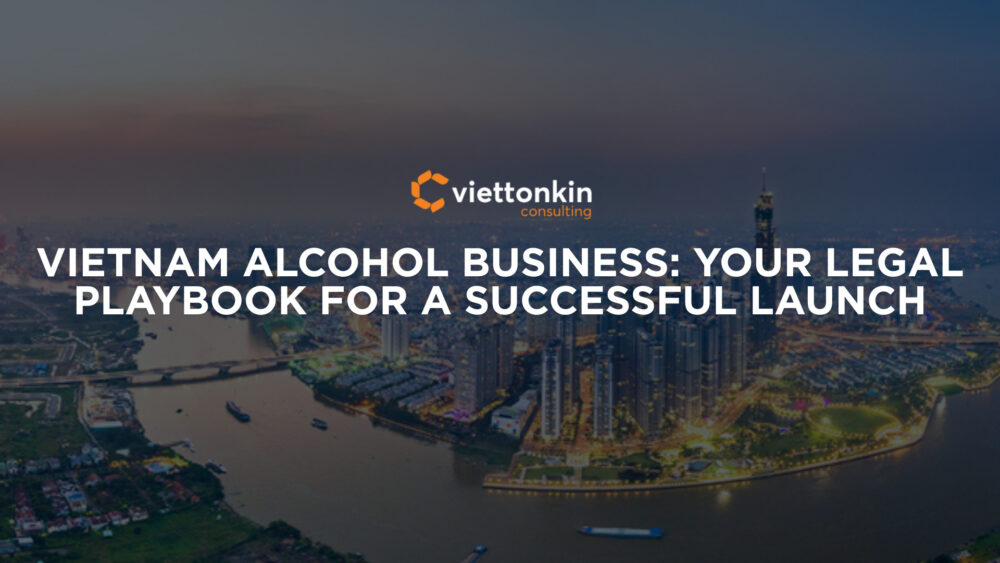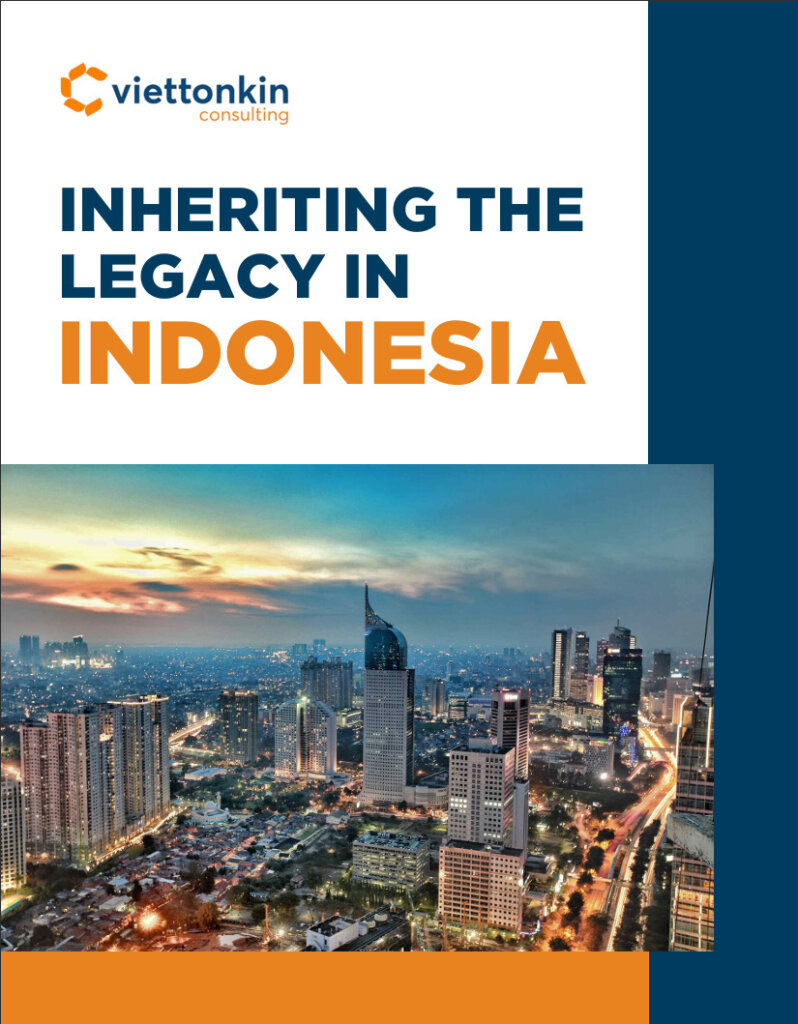As Indonesia steps into a new era of opportunity, the archipelago stands at the crossroads of political continuity and economic transformation. Indonesia’s GDP is expected to reach USD 1.463 trillion in 2025 with stable growth, underscoring its macroeconomic resilience. To help investors navigate this landscape, our new ebook, INHERITING THE LEGACY IN INDONESIA, provides a […]
The legal documentation to launch a new liquor brand seemed straightforward, until we hit the reality of Vietnamese regulatory interpretation.
In my 6+ years managing client relationships at Viettonkin, I’ve learned that the biggest risks aren’t in the laws you can read, but in the unwritten rules and practical hurdles you can’t. My role isn’t just to be a lawyer; it’s to be the guide who protects our clients’ dreams from those hidden pitfalls.
Key Takeaways:
- Producing and selling alcohol with an alcohol content of 5.5 degrees or higher is a conditional business sector requiring strict legal compliance.
- Alcohol sales in Vietnam are subject to strict regulatory oversight and compliance requirements, making it essential for businesses to understand and adhere to all relevant laws.
- A solid business plan must account for meeting conditions related to facilities, legal capital, and qualified technical personnel.
- Understanding core legal documents like the Law on Investment 2020 and Decree 105/2017/ND-CP are essential steps for long-term success.
- Foreign investors face additional conditions, and partnering with local wholesale distributors can be a key part of the market entry strategy.
- Common mistakes like improper labeling can lead to severe penalties and disrupt your entire business operation.
I. Understanding the Playing Field: Vietnam's Conditional Alcohol Landscape

Working directly with CEOs and international investors, I’ve noticed many are drawn to the potential of Vietnam’s beverage industry but underestimate its complexity. The spirits industry in Vietnam is experiencing significant growth, but it is also marked by regulatory complexity.
The Vietnamese government’s strict control over alcohol production, especially distilled spirits, isn’t to create barriers, but to ensure product quality, safety for consumers, and social order.
From my experience, this is where most businesses run into trouble without proper guidance. The sector “Production of Alcoholic Beverages with Alcohol Content from 5.5 Degrees or Higher” is listed in Appendix IV of the Law on Investment 2020.
This means the entire supply chain, from a small craft distiller to a large industrial producer, is subject to specific licensing and operational conditions.
Our job is to translate these complex regulations into a clear compliance roadmap, allowing our customers to focus on how to create their brand.
The Legal Foundation: Building Your Business for Sustainable Growth
After many years of resolving FDI legal challenges, I can confirm that a solid business structure begins with a deep understanding of the law.
Properly registering your company and ensuring it meets all legal requirements for operating in the alcohol business is essential for compliance and long-term success. The key documents you need to master include:
- Law on Investment 2020: The framework for all investment activities.
- Decree No. 105/2017/ND-CP: Outlines detailed regulations for the alcohol business.
- Decree No. 17/2020/ND-CP: Amends and supplements Decree 105.
- Law on Food Safety 2010: All alcoholic beverages are classified as food products.
- Law on Environmental Protection 2020: A mandatory requirement for production facilities.
Staying updated on these regulations is critical for sustainable growth. We don’t just provide legal services; we ensure our clients’ operations always stand on solid legal ground.
II. Business Conditions: Meeting the Entry Criteria

To launch a new alcohol brand successfully, you need to be thoroughly prepared. Based on helping hundreds of clients, these are the key requirements we consistently advise on:
- Legal/Enterprise: Industrial production requires an enterprise established under the Law on Enterprises. Craft production allows for more flexible business type options (e.g., cooperative, household business). Depending on your market strategy and resources, you may decide to focus on certain types of alcoholic beverages to offer.
- Facilities: Machinery and equipment must match the proposed production scale. An approved Environmental Impact Assessment (EIA) is mandatory. Finding the right location with the right tools is one of the first essential steps. Selecting a reliable manufacturer is also crucial to ensure production quality and regulatory compliance.
- Capital: Charter capital directly affects the annual license tax and your business’s credibility in the market. Legal capital is a minimum requirement that must be met.
- Licenses & Compliance: A Certificate of Food Safety Compliance is crucial. Strict compliance with alcohol labeling rules is also required.
- Personnel: You must have technical staff with appropriate qualifications. This often proves to be a practical challenge for smaller facilities.
We help our clients develop a solid plan to meet all these requirements, ensuring their business is compliant from day one.
III. Licensing Procedures: Your Blueprint for Market Entry
The journey to obtain an alcohol production license can be intricate. Establishing clear processes is essential to ensure all licensing and compliance requirements are met efficiently. Here’s how we break down the process for our customers:
Industrial Alcohol Production License:
- Authority: The Department of Industry and Trade of the province/city where the facility is located.
- Dossier includes: Application form, copy of Enterprise Registration Certificate, food safety documents, environmental documents, product list, and label samples.
- Processing time: Typically 10-15 working days.
Craft Alcohol Production License for Commercial Purposes:
- Authority: District-level Economic Division or Division of Economy and Infrastructure.
- Dossier includes: Similar documents to industrial production, with some adjustments for smaller-scale operations.
Preparing an accurate dossier and liaising with the relevant authorities, including the trade bureau and the department responsible for the tobacco tax, requires meticulous attention to detail.
Our team ensures all requirements are met efficiently, accelerating the time it takes to get your products onto the shelves of liquor stores.
IV. Navigating Ongoing Oversight: The Authorities You Need to Know
What I always tell my clients is that getting your production license is the starting line, not the finish line. From that point on, your focus shifts to maintaining ongoing compliance, because you will be under the supervision of several key authorities.
Beyond the Department of Industry and Trade who issued your license, you need to be prepared for inspections from others.
From my experience, the Market Surveillance Teams are known for conducting routine and unannounced checks on everything from product labels to distribution channels.
At the same time, the Food Safety Authority will verify that you are consistently adhering to the hygiene and safety regulations you committed to in your application. Similarly, the Department of Natural Resources and Environment will monitor your facility to ensure you’re complying with your approved environmental protection plan.
Being audit-ready at all times isn’t just about avoiding fines; it’s about protecting your brand’s reputation and ensuring operational continuity. You need to effectively manage compliance processes and documentation to maintain smooth operations.
V. Practical Issues & Requirements for Foreign Investors

When working with international investors, I always emphasize the on-the-ground realities in Vietnam. Unlike the three-tier system many are familiar with in other states, Vietnam’s market has its own unique aspects.
- Lack of Technical Personnel: This is a common bottleneck.
- Label Control: Many producers are penalized for non-compliant labels. The rules are extremely strict.
- Contract Manufacturing: Roles and responsibilities must be clearly defined to avoid legal trouble. Manufacturers play a crucial role in the alcohol supply chain, so choosing the right manufacturing partners is essential for ensuring compliance and product quality.
For foreign investors, while the opportunity for growth is significant, it’s important to note:
- Ownership Restrictions: As a conditional sector, foreign ownership may be limited.
- WTO Commitments: The sector is not fully liberalized, so market access may require special licenses.
A significant amount of money is required to invest in the alcohol business in Vietnam, but the potential for profitability in this sector is substantial.
From our client success experience, what really matters is that navigating these specific requirements with a strategic approach is what separates a successful foreign-led alcohol brand from one that gets stuck in regulatory limbo.
VI. Conclusion: A Measured Toast to Success
The alcohol production business in Vietnam, while complex, offers significant commercial opportunities.
When launching a new alcohol business, careful planning and strict compliance with legal requirements are essential to ensure a successful entry and long-term growth in the market.
Success in this sector hinges not just on market research and understanding your target audience, but critically, on meticulous compliance with all legal conditions.
From a client protection perspective, what really matters is treating regulation not as a hurdle, but as an integral part of your business strategy. By doing so, companies can capitalize on the opportunities and build a sustainable presence.
To ensure your venture is built on a foundation of sound legal advice and strategic foresight, connect with us, your trusted partner for business success in Vietnam.
You might find this helpful: The Complete 2025 Guide to Doing Business in Vietnam as a Foreigner
Frequently Asked Questions
What is the biggest mistake new liquor brands make in Vietnam?
In my experience, the biggest mistake is underestimating the importance of labeling and food safety compliance. Many brand owners focus heavily on marketing to potential customers and neglect small legal details that can result in heavy fines and operational suspensions.
How long does it realistically take to get an alcohol production license?
While the official processing time is 10-15 working days, the entire process, including preparing the dossier, meeting facility requirements, and receiving the final license, can realistically take 1 to 3 months. This timeline depends heavily on thorough preparation and effective coordination with authorities.
For a new alcohol brand, should I start with industrial or craft production?
This depends on your business plan and target market. Craft production allows you to test the market with lower initial capital and build a unique brand story. Industrial production is suitable when you have a solid plan for rapid scaling and reaching major retailers and liquor stores. Consider the different channels through which you can sell your products, such as direct-to-consumer, wholesale, or through licensed retailers, as each production method may align better with specific sales strategies.












